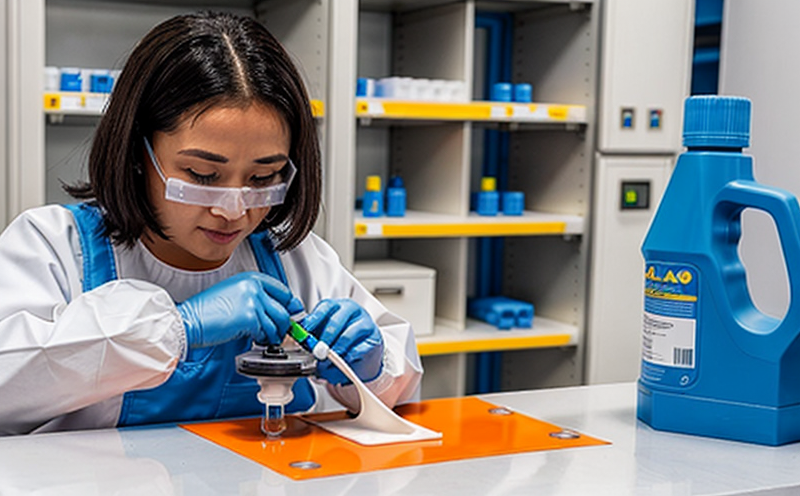ASTM D882 Tensile Properties of Nano Modified Adhesive Films
The ASTM D882 standard is widely recognized as one of the most important tests in adhesive and sealant development, compliance, and quality assurance. This test method evaluates the tensile properties of thin specimens, typically between 10-50 microns thick, using a pre-defined testing apparatus and procedure. The primary application of ASTM D882 is to provide data on the tensile strength, elongation at break, and other mechanical properties of adhesives under defined conditions.
Nano additives have become increasingly popular in adhesive formulations due to their potential to enhance various physical and chemical properties. These nanomaterials can improve adhesion, strength, toughness, and resistance to environmental factors such as UV radiation and moisture. However, the introduction of nano additives into these materials requires careful characterization through standardized tests like ASTM D882.
This service involves testing nano-modified adhesive films for their tensile properties using ASTM D882 methodology. The process begins with sample preparation where nanomaterials are incorporated into the adhesive matrix according to specific ratios and mixing procedures. Specimens are then cut to standard dimensions ensuring uniformity, which is crucial for accurate mechanical property determination.
The testing itself uses a universal testing machine equipped with appropriate fixtures capable of handling thin specimens up to 50 microns thick. During the test, samples are stretched until failure at controlled rates following the prescribed loading conditions outlined in ASTM D882. Data collected includes maximum tensile strength, elongation at break, and other relevant parameters.
Accurate sample preparation is critical for reliable results as even slight variations can significantly influence outcomes. Proper techniques include ensuring proper dispersion of nanoparticles within the adhesive matrix to avoid aggregation or clustering which could lead to inaccurate measurements. Additionally, careful handling during specimen cutting ensures consistent geometry across all samples being tested.
Once testing has been completed, comprehensive reports are generated detailing all measured properties along with statistical analysis where appropriate. These reports provide valuable insights into how nano additives affect the mechanical performance of adhesives under defined conditions specified by ASTM D882.
The results from this test can be used to optimize formulations, ensure compliance with regulatory requirements, and demonstrate product quality to stakeholders such as customers or regulatory bodies. By providing accurate data on tensile properties for nano-modified adhesives, we help our clients make informed decisions about their adhesive products.
Quality and Reliability Assurance
The ASTM D882 tensile properties test is a cornerstone of quality assurance in the production of adhesives and sealants. Ensuring consistent performance across batches and manufacturers requires rigorous testing protocols that meet international standards like ASTM D882.
Our laboratory adheres strictly to these guidelines, employing highly trained personnel equipped with state-of-the-art equipment tailored specifically for nanomaterials analysis. Our commitment to quality is further reinforced through continuous training and adherence to best practices in sample preparation and testing procedures.
In addition to meeting ASTM D882 requirements, we also follow other relevant standards such as ISO 17809 which specifies the test method for tensile properties of thin films using a different approach but complementary information. This ensures comprehensive coverage of all necessary aspects related to nanomaterials in adhesives.
Through regular calibration and validation of our instruments, we maintain precision and accuracy throughout every step of the testing process. This guarantees that each measurement is reliable and reproducible, providing confidence in the results provided by ASTM D882 tensile tests on nano-modified adhesives.
We also offer additional services such as accelerated aging studies to assess long-term durability under various environmental conditions. By incorporating these extended evaluations into our testing protocols, we ensure that our clients receive complete data sets reflecting real-world performance scenarios.
Customer Impact and Satisfaction
- Ensures consistent quality of nano-modified adhesive films across different batches or suppliers
- Aids in optimizing formulations to enhance desired properties such as adhesion strength, flexibility, and UV resistance
- Provides reliable data on tensile properties which is crucial for demonstrating product quality to customers or regulatory bodies
- Maintains high levels of customer satisfaction by delivering accurate and reproducible results
- Supports compliance with international standards like ASTM D882, ensuring adherence to global best practices
By leveraging our expertise in nano-modified adhesive films testing using ASTM D882, customers can be confident that their products meet the highest quality standards. This not only enhances brand reputation but also fosters trust among end-users and stakeholders.
Use Cases and Application Examples
- Incorporation of nano additives into adhesives used in aerospace applications to improve their resistance to extreme temperatures and chemicals
- Development of high-performance construction adhesives where enhanced strength is essential for structural integrity
- Manufacturing of medical devices requiring biocompatible adhesives that must adhere securely while being exposed to various biological fluids
- Production of automotive adhesives designed to withstand harsh environmental conditions including temperature fluctuations, humidity, and exposure to sunlight
In each case, accurate characterization through ASTM D882 tensile tests plays a crucial role in ensuring that the final product meets stringent performance criteria. This testing ensures reliability and safety critical for these industries.





